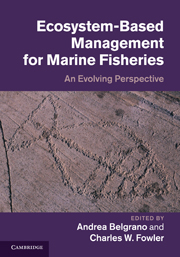Book contents
- Frontmatter
- Contents
- List of contributors
- Foreword
- Acknowledgments for cover artwork
- Introduction
- PART I CURRENT FORMS OF MANAGEMENT
- PART II ELEMENTS OF IMPORTANCE TO MANAGEMENT
- 5 Unintended consequences sneak in the back door: making wise use of regulations in fisheries management
- 6 Population dynamic theory as an essential tool for models in fisheries
- 7 Recovery of former fish productivity: philopatric behaviors put depleted stocks in an unforeseen deadlock
- 8 Boundary shifts: from management to engagement in complexities of ecosystems and social contexts
- 9 Civil society and ecosystem-based fisheries management: traditional roles and future opportunities
- PART III USING PATTERNS
- Afterword
- Index
- Plate section
5 - Unintended consequences sneak in the back door: making wise use of regulations in fisheries management
from PART II - ELEMENTS OF IMPORTANCE TO MANAGEMENT
Published online by Cambridge University Press: 17 February 2011
- Frontmatter
- Contents
- List of contributors
- Foreword
- Acknowledgments for cover artwork
- Introduction
- PART I CURRENT FORMS OF MANAGEMENT
- PART II ELEMENTS OF IMPORTANCE TO MANAGEMENT
- 5 Unintended consequences sneak in the back door: making wise use of regulations in fisheries management
- 6 Population dynamic theory as an essential tool for models in fisheries
- 7 Recovery of former fish productivity: philopatric behaviors put depleted stocks in an unforeseen deadlock
- 8 Boundary shifts: from management to engagement in complexities of ecosystems and social contexts
- 9 Civil society and ecosystem-based fisheries management: traditional roles and future opportunities
- PART III USING PATTERNS
- Afterword
- Index
- Plate section
Summary
Abstract
In this chapter we discuss the potential failure of simple management models. Analysing components of a complex adaptive system in isolation is often misleading. The fundamental complexity of the social and natural environment has to be fully accounted for if unpleasant surprises are to be avoided. We examine a list of general management tools used in real-world fisheries, arguing that the success of a given instrument depends not only on its inherent properties but also on the way these instruments are administered. Similarly, we address how uncertainty and the biological complexity of the resource system may result in unintended consequences, including unanticipated costs. This demonstrates that for each resource system, the informational constraints have to be considered. Hence, interdisciplinary research is mandatory in order to reach adequate management decisions for social–ecological systems.
Introduction
Marine fish stocks are renewable natural resources. They have the potential to provide food, income, and other services to mankind on a sustainable basis (Smith et al. 2010). Yet in reality, overfishing – the wasteful exploitation of marine resources – is a widespread observable fact (Jackson et al. 2001, Hilborn et al. 2003, Myers and Worm 2003, Worm and Myers 2004). On the one hand, there is no doubt that globally fisheries are in crisis (Clark 2006). On the other hand, how we can manage to rebuild global fisheries is still under debate (Worm et al. 2009).
- Type
- Chapter
- Information
- Ecosystem Based Management for Marine FisheriesAn Evolving Perspective, pp. 183 - 217Publisher: Cambridge University PressPrint publication year: 2011
- 4
- Cited by



